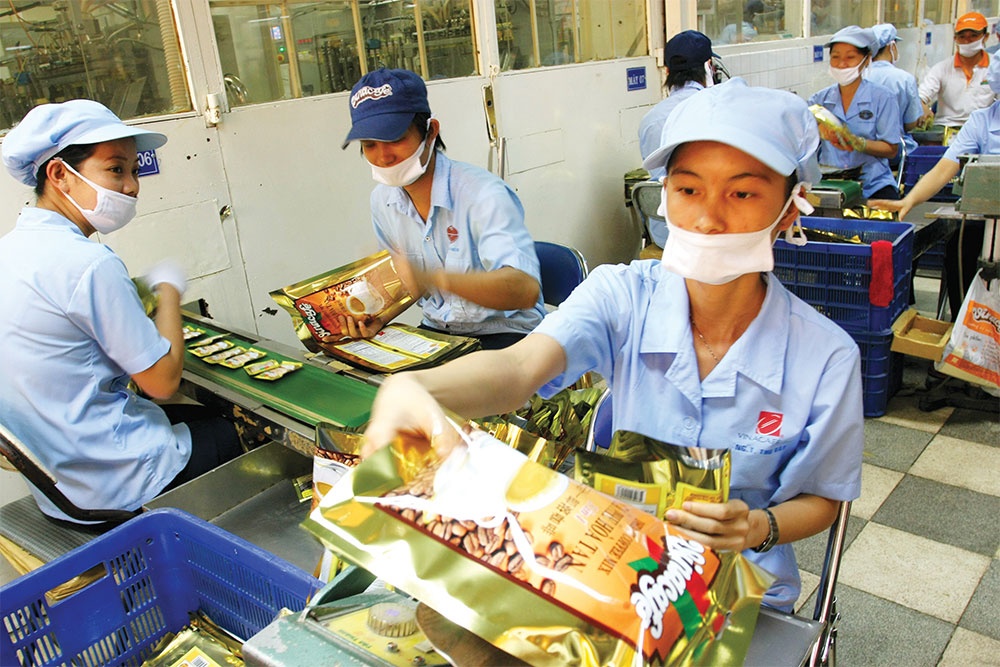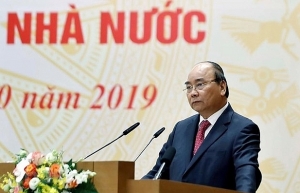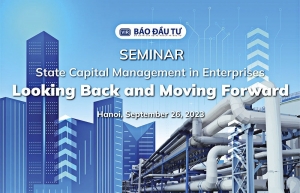State-owned group reform failing to meet expectations
 |
| The government insists that the remuneration regime for state employees must create more motivation, Photo: Le Toan |
The government last week admitted at the National Assembly that Vietnam’s efforts to restructure state-owned enterprises (SOEs) are still too slow and failing to meet expectations, meaning plans to draw in private investment and ameliorate the economy’s competitiveness are being thwarted.
“The speed of equitisation and divestment has continued to be slower than planned. The number of SOEs slated for equitisation and divestment remains humble, and the number of those enterprises with restructuring schemes approved also remains low,” stated a government report on the issue submitted to the National Assembly (NA).
As approved in November 2022, 19 SOEs were to be equitised by 2025, 26 SOEs were to be reformed, and up to 141 SOEs were to be divested.
In 2021, only four SOEs were equitised with total corporate value of $14 million, including $8.3 million worth of state capital.
The following year, only one enterprise followed suit – An Giang Ferry One-Member Co., Ltd. – with a total value of $13 million, including $11.7 million worth of state capital.
As of April 25 this year, 27 SOEs have had restructuring schemes approved – including Petrolimex, Vietnam Forest Corporation, and others managed by the provinces of Ha Tinh, Hoa Binh, Lai Chau, Ninh Thuan, Thai Binh, and Tra Vinh.
Cumulatively, money collected from selling state capital was $42.2 million in 2021 and $162.36 million last year – including nearly $106 million for the central budget and $56.45 million for the local budget.
Last year, state-run groups and corporations divested capital from 31 enterprises and then collected $164.5 million. In Q1 of 2023, state-run groups and corporations divested capital from four enterprises and then collected $7.1 million.
NA deputy Tran Hoang Ngan, representing Ho Chi Minh City, strongly urged the government to quicken reforms as soon as possible. “The restructuring, arrangement, and renewal of SOEs and state-owned units have failed to meet the requirements. It is necessary to promote strong restructuring, quickly handling inefficient enterprises, and further promoting the role of groups, corporations, and SOEs in implementing major national projects,” Ngan said.
“More capital must be invested into the economy’s key industries related to materials, metallurgy, and mechanics in particular.”
Stronger determination
For many years, the Vietnamese government has been looking for ways to reduce its direct ownership in key state enterprises and so to broaden private ownership.
Since 2021, to implement Resolution No.31/2021/QH15 on SOE restructuring for the 2021-2023 period, a number of documents were enacted, with many having been amended and supplemented to maximise the state benefit and remove difficulties for equitisation and divestment, while also preventing losses of state capital and assets.
The government also submitted to the NA amendments on various laws including those on public investment, public-private partnerships, housing, bidding, electricity, excise tax, and enforcement of civil judgments.
In addition, the government also issued Resolution No.68/NQ-CP in May 2022 on mobilising resources of SOEs for socioeconomic development, while also amending and supplementing decrees involving the Law on Enterprises, reshuffling SOEs holding 100 per cent of chartered capital, and managing and using money transferred from corporate ownership changes.
What is more, the prime minister also newly issued, amended, and supplemented four decisions related to SOE equitisation and divestment, while ministries submitted SOE restructuring initiatives for approval in the fields under their management.
These documents have helped reshuffle some SOEs in a more effective manner, said the government report.
“For example, though wholly-state owned enterprises occupy 0.08 per cent of the total number of enterprises in the economy, they hold 7 per cent of total assets and 10 per cent of total equity of all enterprises,” it stated. “The scale of their assets, profits, and contributions to the state budget has increased, with an average increase of 25 per cent of pre-tax profits since 2021. This has created a significant motivation for national economic development.”
Furthermore, SOEs continue to act as a major provider of essential products and services for society, directly participating in activities serving national defence and security, as well as building and developing infrastructure crucial for economic development such as transport, agriculture, and telecommunications.
Failure of responsibility
Minister of Planning and Investment Nguyen Chi Dung underlined that despite advantages, the process of restructuring SOEs in Vietnam still has many limitations, and is not ensuring both quality and quantity.
“Corporate governance innovation in production and business operations remains slow, and is not oriented towards strong international principles and practices, and not in line with a modern market economy,” he said. “The remuneration regime and handling responsibility for state employees fail to create motivation associated with responsibility under the market mechanism.”
There have been negative cases in determining enterprise values, especially related to land, causing loss of state capital and assets when equitisation and divestment, Minister Dung added.
Moreover, SOEs in general have failed to play their role in driving the development of other sectors and promoting value chain links. They also remain feeble in sectors that influence the improvement of the economy’s competitiveness, such as high technology, precision mechanics, component manufacturing, and source technology.
Most SOEs in key sectors operate in a close-ended manner, which have not created conditions for other enterprises to participate in their value chains. According to Minister of Finance Ho Duc Phoc, the inadequate policies for managing SOEs remain a major cause behind their slow innovation and confusion in formulating business and investment strategies and plans. Besides that, policies on salary and remuneration remain unattractive for SOEs to attract high-quality human resources.
“The legal framework for management and usage of state capital at SOEs should be reviewed and improved in line with the amendments to the bidding and land laws to ensure efficiency,” Phoc said.
Global experience has shown that, while it is possible to manage SOEs efficiently, both developed and developing countries have often struggled to effectively do so. Preferential treatment of SOEs, such as access to capital and land, has often constrained private sector development.
“If not managed well, SOEs can waste public resources, divert funds away from productive activities, and hinder socioeconomic development. This can undermine economic performance and public confidence in the state sector,” said economist Raymond Mallon.
He suggested SOEs should also not be exempt from the application of laws (especially those on companies, competition, and bankruptcy) and regulations that apply to private firms, and should not receive preferential treatment. “SOEs should enforce separation between commercial and non-commercial activities and be guaranteed adequate and transparent compensation for their public service objectives,” Mallon said.
In line with good practices, the Vietnamese government has acted to separate its ownership and regulatory functions, establishing the Commission for the Management of State Capital at Enterprises in 2018 to exercise ownership of major SOE groups such as the State Capital Investment Corporation, PetroVietnam, Vietnam Electricity, and Petrolimex.
“This is a step towards reducing potential conflicts of interest in sectors where the government is both an owner and a regulator of enterprises,” Mallon said. “Separating ownership and regulation responsibilities can help level the playing field and enhance competition between enterprises, regardless of their ownership.”
The establishment of a dedicated ownership agency, empowered to monitor chairpersons and/or directors who fail to perform regardless of their status, can help provide greater incentives for SOE management to act in the national interest, he added.
 | PM: each State group, corporation must be an innovation centre Prime Minister Nguyen Xuan Phuc asked each State-owned group and corporation to become centre for innovation during a conference in Hanoi on October 16. |
 | State-owned groups keen on roadmaps for reform Many state-owned enterprises are finding their growth potential curtailed, highlighting the need for regulatory reform and increased collaboration. |
What the stars mean:
★ Poor ★ ★ Promising ★★★ Good ★★★★ Very good ★★★★★ Exceptional
Related Contents
Latest News
More News
- SK Innovation-led consortium wins $2.3 billion LNG project in Nghe An (February 25, 2026 | 07:56)
- THACO opens $70 million manufacturing complex in Danang (February 25, 2026 | 07:54)
- Phu Quoc International Airport expansion approved to meet rising demand (February 24, 2026 | 10:00)
- Bac Giang International Logistics Centre faces land clearance barrier (February 24, 2026 | 08:00)
- Bright prospects abound in European investment (February 19, 2026 | 20:27)
- Internal strengths attest to commitment to progress (February 19, 2026 | 20:13)
- Vietnam, New Zealand seek level-up in ties (February 19, 2026 | 18:06)
- Untapped potential in relations with Indonesia (February 19, 2026 | 17:56)
- German strengths match Vietnamese aspirations (February 19, 2026 | 17:40)
- Kim Long Motor and AOJ Suzhou enter strategic partnership (February 16, 2026 | 13:27)

 Tag:
Tag:



















 Mobile Version
Mobile Version